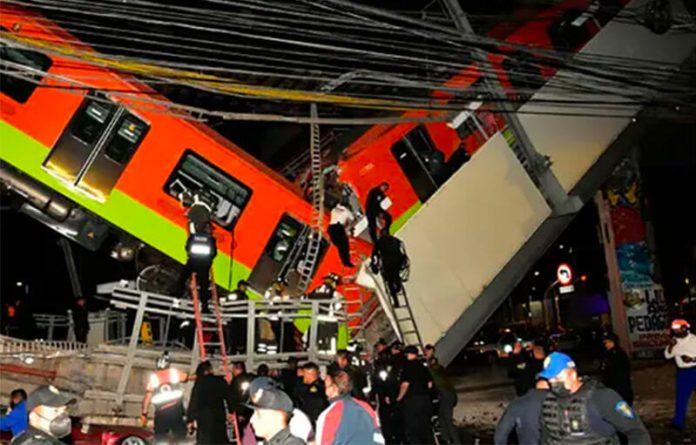Missing bolts in beams and poor welding contributed to the collapse of an overpass on Line 12 of the Mexico City Metro, according to a Norwegian company contracted to conduct an independent investigation into the May 3 accident that claimed the lives of 26 people.
DNV said the results of its analysis indicated that the collapse – which caused a train to plunge onto a busy road below – occurred due to the buckling of north and south beams on the elevated section of Line 12, the newest line of the capital’s subway system.
A lack of “functional bolts” along a “significant” stretch of the section caused the overpass to lose its structural integrity, the firm said in a 182-page technical report that was published by Mexico City Civil Protection authorities on Tuesday.
As a result, the structure was operating as two independent girders – one concrete, one steel – when the accident occurred, the report said. The beams were subjected to weight they weren’t designed to support, it added.
“This created conditions that led to the distortion of the central transverse frame and the initiation and propagation of fatigue cracks that further reduced the capacity of the structure to support the load,” DNV said.
“The factors that contributed to the lack of functionality in the bolts included bolts with deficient welding, missing bolts and poorly positioned bolts. The possible factors that contributed to the collapse include deficiencies in the mechanical properties of the beams and in the design of the transverse frame, which didn’t meet applicable design standards,” the company said.
DNV concluded that the deficiencies were present before a powerful earthquake damaged parts of Line 12 in September 2017, stating that sections of the collapsed overpass were in a “compromised condition.”
The firm said in an earlier preliminary report that the accident was caused by “structural faults associated with deficiencies in the construction process.”
A New York Times investigation published in June also found serious flaws in the construction of the collapsed overpass. It said “steel studs that were vital to the strength of the overpass — linchpins of the entire structure — appear to have failed because of bad welds, critical mistakes that likely caused the crash.”
Line 12, also known as the Golden Line, was built by a consortium that included Mexican firm Ingenieros Civiles Asociados (ICA), Carso Infrastructure and Construction – owned by billionaire businessman Carlos Slim – and French rail company Alstom.
The news agency Reuters was unable to obtain comment about DNV’s report from any of the companies.
The Mexico City government announced last week that repairs to Line 12 will take a year. ICA and Carso have committed to completing the repairs and covering their costs.
The entirety of the line, which runs across southern Mexico City from Mixcoac in the west to Tláhuac in the east, “will be safe and in a better condition than when we received it,” said Metro director Guillermo Calderón, who took charge of the system eight weeks after the accident occurred.
Mexico City Mayor Claudia Sheinbaum said the repair work, which includes the reinforcement of the entire elevated section of the line with metal beams, would begin as soon as possible.
With reports from El Universal and Reuters
